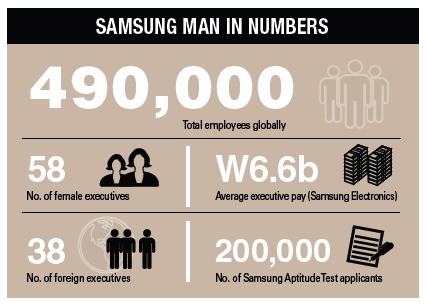Samsung Group, the largest conglomerate in South Korea, was founded as a small trade firm by the late founder Lee Byung-chull in Daegu in 1938 that shipped dried fish to China.
Now managing the world’s largest electronics firm under its wings along with many other businesses, Samsung has become the most coveted workplace here.
Its flagship unit Samsung Electronics topped the list of the most desired employers in Korea for six consecutive years, according to a 2014 survey by Saramin, a job portal.
 |
Samsung Group’s headquarters in Seocho-dong, southern Seoul (Bloomberg) |
Becoming a Samsung employee, or more affectionately called “Samsung Man,” gives bragging rights for job seekers and their family.
“High social status along with generous pay and perks are major factors that entice job seekers every year,” said a 28-year-old graduate who plans to apply for a job at Samsung next week.
Around 490,000 employees work at Samsung’s 30 affiliates, with half of them working outside Korea. The figure is the highest among the nation’s top 30 businesses.
Samsung Electronics alone hires some 280,000 workers, spending more than 21 trillion won ($19 billion) on labor costs, including generous welfare benefits for employees and their family members.

Executive pays are also the highest among top conglomerates. The annual average salary stands at about 6.6 billion won, as compared to about 5 billion won of the runner-up SK Group.
Their benefits are even more lavish, including a luxury sedan car, a corporate credit card, free medical checkups for their family members and free admission to golf courses run by Samsung affiliates.
“Great benefits come with great responsibility. Those in the top echelon work ceaselessly and their entire lives revolve around their work,” said a Samsung official on condition of anonymity.
“Family-work balance is still considered a fairy tale.”
But many Samsung workers agree that a fresh breath of change is blowing in the group’s corporate culture overall.
“Senior workers are still willing to sacrifice for the company but the younger generation puts more emphasis on their work-life balance,” said a Samsung employee who is in his sixth year of employment.
According to a survey published on the group’s Web magazine last month, 8 out of 10 employees and executives said they felt some kind of generation gap at the workplace.
More than 50 percent of the respondents who have worked for less than 10 years said they could not understand why senior workers prioritize work over their personal life, while the same number of people said the juniors never sacrifice enough.
“The young generation tends to be blunt and they make complaints directly to their seniors, which was not easy in the past. They also want rewards for every contribution they make at work,” said an official from Samsung Electronics.
“Despite such a generational gap, it is also true that they are trying to understand each other more and more.”
Reflecting the changing landscape, Samsung has also started to revamp its decades-old hiring system.
Back in 1993, Samsung chairman Lee Kun-hee introduced an objective evaluation system for selecting new employees. Since 1995, Samsung has conducted the Samsung Aptitude Test, the group’s unique entrance exam that attracts more than 200,000 applicants every year.
But this test is being replaced with a new recruitment system this year, according to Samsung.
The new system, which will be adopted in the latter half of the year, includes essays and interviews to better evaluate applicants’ personality and their hands-on experience rather than education background and English test scores.
Industry watchers predict the new hiring system could change the characteristics of future Samsung employees and affect the hiring process of other big businesses overall.
By Kim Young-won (
wone0102@heraldcorp.com)









